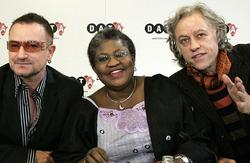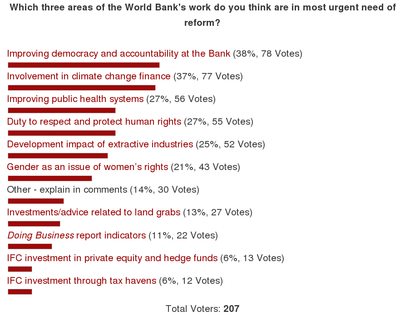High level policy dialogue between the Alliance for a Green Revolution in Africa (AGRA)
http://allafrica.com
http://www.agra-alliance.org
http://kofiannanfoundation.org
This photo story highlights key moments in a policy dialogue that involved small scale farmers and representatives of the Alliance for a Green Revolution in Africa (AGRA). Over one hundred people participated in this unprecedented event:
DOWNLOAD PDF http://pubs.iied.org/pdfs/G03349.pdf
IIED, APPG on Agroecology, CNOP, Kene conseils, Centre Djoliba, IRPAD
IIED code: G03349
Published: Apr 2012 – IIED
Areas: Ghana, Mali, Burkina Faso, Senegal, Benin
Topics: Agriculture & Food, Participation
Details: Project info
Language: English
This photo story highlights key moments in a policy dialogue on agricultural research for development that involved small scale farmers and representatives of the Alliance for a Green Revolution in Africa (AGRA). Over one hundred people participated in the policy dialogue. This unprecedented event was chaired by the UN Special Rapporteur on the Right to Food and took place on 1st to 3rd February 2012 in Accra (Ghana).

GRAIN | 13 April 2012According to worldbankpresident.org, Nigeria’s finance minister Ngozi Okonjo-Iweala is in the lead to become the next World Bank president. A former managing director of the Bank, Okonjo-Iweala took a prominent role in presenting to the public the Bank’s study on landgrabbing when it was finally released in 2010. Her stanceon the issue? Large scale land deals are „a growing reality“, and the „veil of secrecy“ around them must be lifted so that poor people don’t lose their lands. In plain English, she is not against these land deals. (The same can be said of most, if not all, African governments.) She seems to support instead the win-win approach to land grabbing championed by the Bank from the get go. This means crafting and implementing the deals with due regard for human rights and social concerns, environmental protections, fair wages, compensations and so on. But no fundamental opposition to the kind of agriculture or food system or shifts in power that these massive land deals, pimped as „investments“, carry with them. Or so, in all fairness, we shall see.
The site worldbankpresident.org is also running a public opinion poll (snapshot below) on what are the most urgent issues that the new chief of the World Bank needs to deal with. Land grabbing is up there in the top ranks.
Poll: Priorities for reform at the World Bank
Investments/advice related to land grabs:
One of the hottest controversies in development now is cross-border acquisition of agricultural land. Foreign investors have been accused of “land grabs”, and the Bank has been accused of both funding such grabs as well as setting up the investment framework that facilitates them. NGOs want the World Bank and its International Finance Corporation (IFC) to stop promoting large scale land acquisitions. They believe they should rather support governments and institutions that can provide credit and assistance to family farming and sustainable forms of agriculture, as well as to firms that provide services and markets for small farmers.
Comments are closed.

